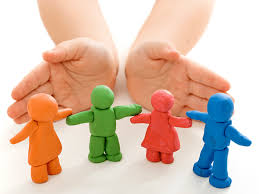Play Therapy

What is Play Therapy?
Play therapy is to children what counseling is to adults. When adults have problems, it often helps for them to share their thoughts and feelings with a trusted friend or a therapist. Children do not have the ability to express themselves with words as adults do, so it is difficult for them to verbalize what is troubling them. Play therapy allows children to communicate through play, their most natural form of expression. The toys in the play therapy room help children “play out” their perceptions of their life experiences, their thoughts and feelings, and their needs and desires. With the help of a trained Play Therapist, children can learn to understand themselves and their world better, work to resolve their problems and develop coping skills to better deal with life.
In play therapy, the therapist will not “pump” the child for information about their life or any traumatic incident. Children are allowed to work through their problems at their own pace. Play therapists do not seek to prove or disprove the occurrence of a traumatic event.
There is much more freedom in the play therapy room than is allowed in other areas of the child’s life. During the therapy session, every thought, feeling, and almost all behaviors of the child are accepted. The freedom that is allowed in the playroom is necessary so that the child will feel accepted, safe, and trusting enough to reveal, and work through, their fears and problems.
In the play therapy setting, typical behaviors for which limits are set are ones which may cause harm to the child, or another child (if in group therapy), to the therapist, or to the playroom toys, equipment or structure. Limits are important in that they help the child feel safe and secure in his/her environment. Limit setting, along with appropriate choice-giving, also helps the child learn self-control, and increases the child’s self esteem.